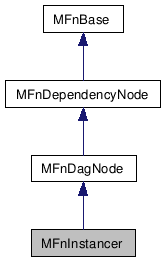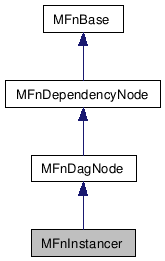MFnInstancer Class Reference
[OpenMayaFX
- API module for effects, FunctionSet classes]
#include
<MFnInstancer.h>


Detailed Description
Particle Instancer object access class.Class for obtaining information about a particle instancer node.
Public Member Functions |
|
| virtual MFn::Type | type () const |
| Function set type. |
|
| virtual | ~MFnInstancer () |
| Destructor. |
|
| MFnInstancer () | |
| Default constructor. |
|
| MFnInstancer (MObject &object, MStatus *ReturnStatus=NULL) | |
| Constructor. |
|
| MFnInstancer (const MDagPath &object, MStatus *ret=NULL) | |
| Constructor. |
|
| int | particleCount () const |
| int | instancesForParticle (int p, MDagPathArray &paths, MMatrix &instancerMatrix, MStatus *ReturnStatus=NULL) const |
| MStatus | allInstances (MDagPathArray &paths, MMatrixArray &matrices, MIntArray &particlePathStartIndices, MIntArray &pathIndices) const |
| MFnInstancer (const MObject &object, MStatus *ret=NULL) | |
| Constructor. |
|
Protected Member Functions |
|
| virtual const char * | className () const |
| Class name. |
|
Constructor & Destructor Documentation
| MFnInstancer::~MFnInstancer | ( | ) | [virtual] |
Destructor.
Class destructor.
Constructor.
Class constructor that initializes the function set to the given MObject.
- Parameters:
-
[in] object The MObject to attach the function set to [out] ReturnStatus the return status
- Status Codes:
-
- MS::kSuccess if the function set is successfully attached
- MS::kInvalidParameter if the MObject does not represent a valid Maya object or if the function set is not allowed to attach to this MObject
Constructor.
Class constructor that initializes the function set to the given constant MDagPath object.
- Parameters:
-
[in] object The const MDagPath to attach the function set to [out] ReturnStatus The return status
- Status Codes:
-
- MS::kSuccess if the function set is successfully attached
- MS::kInvalidParameter if the MObject does not represent a valid Maya object or if the function set is not allowed to attach to this MObject
Constructor.
Class constructor that initializes the function set to the given MObject.
- Parameters:
-
[in] object The MObject to attach the function set to [out] ReturnStatus the return status
- Status Codes:
-
- MS::kSuccess if the function set is successfully attached
- MS::kInvalidParameter if the MObject does not represent a valid Maya object or if the function set is not allowed to attach to this MObject
Member Function Documentation
| MFn::Type MFnInstancer::type | ( | ) | const [virtual] |
| int MFnInstancer::particleCount | ( | ) | const |
Returns the number of particles feeding the active instancer
- Returns:
- See description.
| int MFnInstancer::instancesForParticle | ( | int | p, | |
| MDagPathArray & | paths, | |||
| MMatrix & | instancerMatrix, | |||
| MStatus * | ReturnStatus =
NULL |
|||
| ) | const |
Returns the DAG paths and instancer matrix for all instances generated by a specified particle
- Parameters:
-
[in] p The index of the particle being queried. [out] paths Visible DAG paths generated by particle p [out] instancerMatrix The transformation matrix that the instancer applies to the instanced paths to produce the final particle-instanced geometry. The final world matrix of each instance can be constructed by premultiplying the path's inclusive world matrix by this matrix. [out] ReturnStatus status code
- Returns:
- The number of visible paths instanced for the given particle. It is possible for no paths to be instanced for a particular particle. Note that in order to use this method, the MDagPath must be used in the constructor.
- Status Codes:
-
- MS::kSuccess Success
- MS::kInvalidParameter Invalid particle index or program state
| MStatus MFnInstancer::allInstances | ( | MDagPathArray & | paths, | |
| MMatrixArray & | matrices, | |||
| MIntArray & | particlePathStartIndices, | |||
| MIntArray & | pathIndices | |||
| ) | const |
Returns information about all instances generated by a particular particle instancer node. Since many particles will typically instance similar sets of paths, the information is returned in a compact representation. An array of paths is returned, representing the unique set of paths that are instanced by any particle in the system. For each particle, the routine returns a set of indices into this path array to illustrate the paths instanced at that particle. The index arrays for all particles are concatenated together, so a "start index" array is used to indicate which is the first entry in the index array for each particle. For each particle, the routine also returns the transformation matrix applied to that particle's instanced paths to generate the final particle instance transformations.
- Parameters:
-
[out] paths Receives the unique set of paths instanced by any particle in the system. [out] matrices For each particle p, matrices[p] receives the matrix that the instancer applies to the paths instanced under that particle to generate the final instance transformations. [out] particlePathStartIndices Receives indices into the pathIndices array indicating where the block of indices for each particle begins. The size of this array is always one more than the number of particles in the system. For particle p, the number of paths instanced under that particle is particlePathStartIndices[p+1]-particlePathStartIndices[p]. If this number is 0, then no visible paths are instanced under that particle. So, the set pathIndices[particlePathStartIndices[p]...particlePathStartIndices[p+1]-1] gives the indices into the paths array of the visible paths instanced under particle p. [out] pathIndices Receives indices into the paths array describing the visible paths instanced under each particle. The array is a sequence of variable-sized blocks, one per particle (since each particle in the system can instance a different number of paths). The particlePathStartIndices array determines where in this array to find the path indices for a particular particle.
- Returns:
-
- MS::kSuccess Success
- MS::kInvalidParameter Invalid parameter passed for object - Node is not accessible, does not exist or is not a valid DAG Node